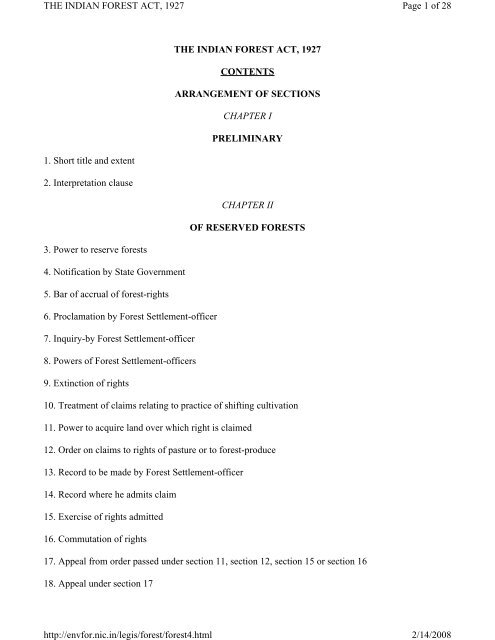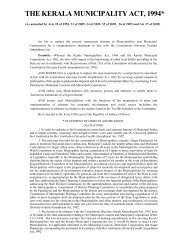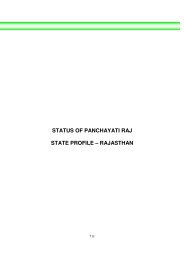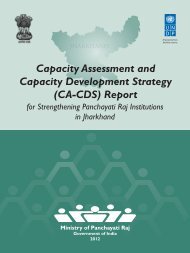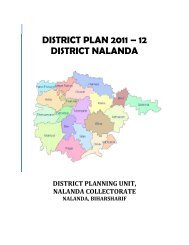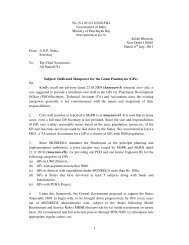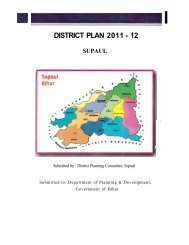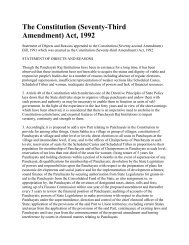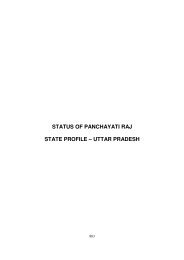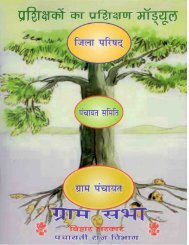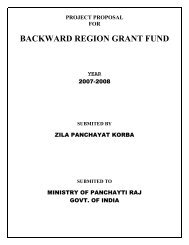Indian Forest Act, 1927 - Forest Rights Act Website
Indian Forest Act, 1927 - Forest Rights Act Website
Indian Forest Act, 1927 - Forest Rights Act Website
- No tags were found...
Create successful ePaper yourself
Turn your PDF publications into a flip-book with our unique Google optimized e-Paper software.
THE INDIAN FOREST ACT, <strong>1927</strong>http://envfor.nic.in/legis/forest/forest4.htmlPage 1 of 282/14/2008THE INDIAN FOREST ACT, <strong>1927</strong>CONTENTSARRANGEMENT OF SECTIONSCHAPTER IPRELIMINARY1. Short title and extent2. Interpretation clauseCHAPTER IIOF RESERVED FORESTS3. Power to reserve forests4. Notification by State Government5. Bar of accrual of forest-rights6. Proclamation by <strong>Forest</strong> Settlement-officer7. Inquiry-by <strong>Forest</strong> Settlement-officer8. Powers of <strong>Forest</strong> Settlement-officers9. Extinction of rights10. Treatment of claims relating to practice of shifting cultivation11. Power to acquire land over which right is claimed12. Order on claims to rights of pasture or to forest-produce13. Record to be made by <strong>Forest</strong> Settlement-officer14. Record where he admits claim15. Exercise of rights admitted16. Commutation of rights17. Appeal from order passed under section 11, section 12, section 15 or section 1618. Appeal under section 17
THE INDIAN FOREST ACT, <strong>1927</strong>http://envfor.nic.in/legis/forest/forest4.htmlPage 2 of 282/14/200819. Pleaders20. Notification declaring forest reserved21. Publication of translation of such notification in neighbourhood of forest22. Power to revise arrangement made under section 15 or section 1823. No right acquired over reserved forest, except as here provided24. <strong>Rights</strong> not to be alienated without sanction25. Power to stop ways and water-courses in reserved forests26. <strong>Act</strong>s prohibited in such forests27. Power to declare forest no longer reserved28. Formation of village-forests29. Protected forests30. Power to issue notification reserving trees, etc.CHAPTER IIIOF VILLAGE-FORESTSCHAPTER IVOF PROTECTED FORESTS31. Publication of translation of such notification in neighbourhood32. Power to make rules for protected forests33. Penalties for acts in contravention of notification under section 30 or of rules under section 3234. Nothing in this Chapter to prohibit acts done in certain casesCHAPTER VOF THE CONTROL OVER FORESTS AND LANDS NOT BEING THE PROPERTYGOVERNMENT35. Protection of forests for special purposes36. Power to assume management of forests
THE INDIAN FOREST ACT, <strong>1927</strong>http://envfor.nic.in/legis/forest/forest4.htmlPage 3 of 282/14/200837. Expropriation of forests in certain cases38. Protection of forests at request of ownersCHAPTER VIOF THE DUTY ON TIMBER AND OTHER FOREST-PRODUCE39. Power to impose duty' on timber and other forest-produce40. Limit not to apply to purchase-money or royaltyCHAPTER VIIOF THE CONTROL OF TIMBER AND OTHER OOREST-PRODUCE IN TRANSIT41. Power to make rules to regulate transit of forest-produce41A. Powers of Central Government as to movements of timber across customs frontiers42. Penalty for breach of rules made under section 4143. Government and <strong>Forest</strong>-officers not liable for damage to forest-produce at depot44. All persons bound to aid in case of accidents at depot.CHAPTER VIIIOF THE COLLECTION OF DRIFT AND STRANDED TIMBER45. Certain kinds of timber to be deemed property of Government until title thereto proved, and maybe collected accordingly46. Notice to claimants of drift timber47. Procedure on claim preferred to such timber48. Disposal of unclaimed timber49. Government and its officers not liable for damage to such timber50. Payments to be made by claimant before timber is delivered to him51. Power to make rules and prescribe penaltiesCHAPTER IXPENALTIES AND PROCEDURE
THE INDIAN FOREST ACT, <strong>1927</strong>http://envfor.nic.in/legis/forest/forest4.htmlPage 4 of 282/14/200852. Seizure of property liable to confiscation53. Power to release property seized under section 5254. Procedure thereupon55. <strong>Forest</strong>-produce, tools, etc., when liable to confiscation56. Disposal on conclusion of trial for forest-offence, of produce in respect of which it was committed57. Procedure when offender not known, or cannot be found58. Procedure as to perishable property seized under section 5259. Appeal from orders under section 55, section 56 or section 5760. Property when to vest in Government61. Saving of power to release property seized62. Punishment for wrongful seizure63. Penalty for counterfeiting or defacing marks on trees and timber and for altering boundary marks64. Power to arrest without wan-ant65. Power to release on a bond a person arrested66. Power to prevent commission of offence67. Power to try offences summarily68. Power to compound offences69. Presumption that forest-produce belongs to GovernmentCHAPTER XCATTLE-TRESPASS70. Cattle-trespass <strong>Act</strong>, 187 1, to apply71. Power to alter fines fixed under that <strong>Act</strong>CHAPTER XIOF FOREST-OFFICERS72. State Government may invest <strong>Forest</strong>-officers with certain powers
THE INDIAN FOREST ACT, <strong>1927</strong>http://envfor.nic.in/legis/forest/forest4.htmlPage 5 of 282/14/200873. <strong>Forest</strong>-officers deemed public servants74. Indemnity for acts done in good faith75. <strong>Forest</strong>-officers not to tradeCHAPTER XIISUBSIDIARY RULES76. Additional powers to make rules77. Penalties for breach of rules78. Rules when to have force of lawCHAPTER XIIIMISCELLANEOUS79. Persons bound to assist <strong>Forest</strong>-officers and Police-officers80. Management of forests the joint property of Government and other persons81. Failure to perform service for which a share in produce of Government forest is employed82. Recovery of money due to Government83. Lien on forest-produce for such money84. Land required under this <strong>Act</strong> to be deemed to be needed for a public purpose under the LandAcquisition <strong>Act</strong>, 189485. Recovery of penalties due under bond85A. Saving for rights of Central Government86. [Repealed.]THE INDIAN FOREST ACT, <strong>1927</strong>(16 of <strong>1927</strong>)[21st September, <strong>1927</strong>]An <strong>Act</strong> to consolidate the law relating to forests, the transit of forest-produce and the duty leviable ontimber and other forest-produce.Whereas it is expedient to consolidate the law relating to forests, the transit of forest produce and the
THE INDIAN FOREST ACT, <strong>1927</strong>http://envfor.nic.in/legis/forest/forest4.htmlPage 6 of 282/14/2008duty leviable on timber and other forest-produce; It is hereby enacted a follows:CHAPTER IPRELIMINARY1. Short title and extent.–(1) This <strong>Act</strong> may be called the <strong>Indian</strong> <strong>Forest</strong> <strong>Act</strong>, 19211[(2) It extends to the whole of India except the territories which, immediately before the 1st November,1956, were comprised in Part B States.(3) It applies to the territories which, immediately before the 1st November, 1956, were comprised in theStates of Bihar, Bombay, Coorg, Delhi, Madhya Pradesh, Orissa, Punj Uttar Pradesh and West Bengal;but the Government of any State may by notification in Official Gazette bring this <strong>Act</strong> into force2 in thewhole or any specified part of that State which this <strong>Act</strong> extends and where it is not in force.]2. Interpretation clause.–In this <strong>Act</strong>, unless there is anything repugnant in the subject or context–(1) "cattle" includes elephants, camels, buffaloes, horses, mares, geldings, ponies colts, fillies, mules,asses, pigs, rams, ewes, sheep, lambs, goats and kids;(2) "<strong>Forest</strong>-officer" means, any person whom 3 [* * *] the State Government or any office empoweredby 3 [* * *] the State Government in this behalf, may appoint to carry out all any of the purposes of this<strong>Act</strong> or to do anything required by this <strong>Act</strong> or any rule m thereunder to be done by a <strong>Forest</strong>-officer;(3) "forest-offence" means an offence punishable under this <strong>Act</strong>or under any rule made thereunder;(4) "forest-produce" includes–(a) the following whether found in, or brought from, a forest or not, that is to say timber, charcoal,caoutchouc, catechu, wood-oil, resin, natural varnish, bark, lac, mahua flowers, mahua seeds,4[kuth] andmyrabolams, and(b) the following when found in, or brought from a forest, that is to say(i) trees and leaves, flowers and fruits, and all other parts or produce not herein before mentioned, oftrees,(ii) plants not being trees (including grass, creepers, reeds and moss), and all parts or produce of suchplants,(iii) wild animals and skins, tusks, horns, bones, silk, cocoons, honey and wax, and all other parts orproduce of animals, and(iv) peat, surface soil, rock and minerals (including lime-stone, laterite, mineral oils, and all products ofmines or quaries);5[(4A) "ownee" includes a Court of Wards in respect of property under the superintendence or charge ofsuch Court;]
THE INDIAN FOREST ACT, <strong>1927</strong>http://envfor.nic.in/legis/forest/forest4.htmlPage 7 of 282/14/2008(5) "river" includes any stream, canal, creek or other channels, natural or artificial;(6) "timber" includes trees, when they have fallen or have been felled, and all wood whether cut up orfashioned or hollowed out for any purpose or not; and(7) "tree" includes palms, bamboos, skumps, brush-wood and canes.CHAPTER IIOF RESERVED FORESTS3. Power to reserve forests.–The State Government may constitute any forest-land or waste-land whichis the property of Government, or over which the Government has proprietary rights, or to the whole orany part of the forest-produce of which the Government is entitled, a reserved forest in the mannerhereinafter provided.4. Notification by State Government.-(1) Whenever it has been decided to constitute any land areserved forest, the State Government shall issue a notification in the Official Gazette–(a) declaring that it has been decided to constitute such land a reserved forest;(b) specifying, as nearly as possible, the situation and limits of such land; and(c) appointing an officer (hereinafter called "the <strong>Forest</strong> Settlement-officer") to inquire into anddetermine the existence, nature and extent of any rights alleged to exist in favour of any person in orover any land comprised within such limits or in or over any forest-produce, and to deal with the sameas provided in this Chapter.Explanation.–For the purpose of clause (b), it shall be sufficient to describe the limits of the forest byroads, rivers, ridges or other well-known or readily intelligible boundaries.(2) The officer appointed under clause (c) of sub-section (1) shall ordinarily be a person not holding anyforest-office except that of <strong>Forest</strong> Settlement-officer.(3) Nothing in this section shall prevent the State Government from appointing any number of officersnot exceeding three, not more than one of whom shall be a person holding any forest-office except asaforesaid, to perform the duties of a <strong>Forest</strong> Settlement-officer under this <strong>Act</strong>.5. Bar of accrual of forest-rights.–After the issue of a notification under section 4, no right shall beacquired in or over the land comprised in such notification, except by succession or under a grant orcontract in writing made or entered into by or on behalf of the Government or some person in whomsuch right was vested when the notification was issued; and no fresh clearings for cultivation or for anyother purpose shall be made in such land except in accordance with such rules as may be made by theState Government in this behalf.6. Proclamation by <strong>Forest</strong> Settlement-officer.–When a notification has been issued under section 4,the <strong>Forest</strong> Settlement-officer shall publish in the local vernacular in every town and village in theneighbourhood of the land comprised therein, a proclamation(a) specifying, as nearly as possible, the situation and limits of the proposed forest;
THE INDIAN FOREST ACT, <strong>1927</strong>http://envfor.nic.in/legis/forest/forest4.htmlPage 8 of 282/14/2008(b) explaining the consequences which, as hereinafter provided, will ensue on the reservation of suchforest; and(c) fixing a period of not less than three months from the date of such proclamation, and requiring everyperson claiming any right mentioned in section 4 or section, 5 within such period either to present to the<strong>Forest</strong> Settlement-officer a written notice specifying or to appear before him and state, the nature of suchright and the amount and particulars of the compensation (if any) claimed in respect thereof.7. Inquiry by <strong>Forest</strong> Settlement-officer.–The <strong>Forest</strong> Settlement-officer shall take down in writing allstatements made under section 6, and shall at some convenient place inquire into all claims dulypreferred under that section, and the existence of any rights mentioned in section 4 or section 5 and notclaimed under section 6 so far as the same may be ascertainable from the records of Government and theevidence of any persons likely to be acquainted with the same.8. Powers of <strong>Forest</strong> Settlement-officers.-For the purpose of such inquiry, the <strong>Forest</strong> Settlement-officermay exercise the following powers, that is to say:(a) power to enter, by himself or any officer authorised by him for the purpose, upon any land, and tosurvey, demarcate and make a map of the same; and(b) the powers of a Civil Court in the trial of suits.9. Extinction of rights.-<strong>Rights</strong> in respect of which no claim has been preferred under section 6, and ofthe existence of which no knowledge has been acquired by inquiry under section 7, shall beextinguished, unless before the notification under section 20 is published, the person claiming themsatisfies the <strong>Forest</strong> Settlement-officer that he had sufficient cause for not prefer-ring such claim withinthe period fixed under section 6.10. Treatment of claims relating to practice of shifting cultivation.—(1) In the case of a claimrelating to the practice of shifting cultivation, the <strong>Forest</strong> Settlement-officer shall record a statementsetting forth the particulars of the claim and of any local rule or order under which the practice isallowed or regulated, and submit the statement to the State Government, together with his opinion as towhether the practice should be permitted or prohibited wholly or in part.(2) On receipt of the statement and opinion, the State Government may make an order permitting orprohibiting the practice wholly or in part.(3) If such practice is permitted wholly or in part, the <strong>Forest</strong> Settlement-officer may arrange for itsexercise(a) by altering the limits of the land under settlement so as to exclude land of sufficient extent, of asuitable kind, and in a locality reasonably convenient for the purposes of the claimants, or(b) by causing certain portions of the land under settlement to be separately demarcated, and givingpermission to the claimants to practise shifting cultivation therein under such conditions as he mayprescribe.(4) All arrangements made under sub-section (3) shall be subject to the previous sanction of the StateGovernment.
THE INDIAN FOREST ACT, <strong>1927</strong>http://envfor.nic.in/legis/forest/forest4.htmlPage 9 of 282/14/2008(5) The practice of shifting cultivation shall in all cases be deemed a privilege subject to control,restriction and abolition by the State Government.11. Power to acquire land over which right is claimed.–(1) In the case of a claim to a right in or overany land, other than a right of way or right of pasture, or a right to forest produce or a water-course, the<strong>Forest</strong> Settlement-officer shall pass an order admitting or rejecting the same in whole or in part.(2) If such claim is admitted in whole or in part, the <strong>Forest</strong> Settlement-officer shall either(i) exclude such land- from the limits of the proposed forest; or(ii) come to an agreement with the owner thereof for the surrender of his rights; or(iii) proceed to acquire such land in the manner provided by the Land Acquisition <strong>Act</strong>, 1894 (1 of 1894).(3) For the purpose of so acquiring such land(a) the <strong>Forest</strong> Settlement-officer shall be deemed to be a Collector proceeding under the LandAcquisition <strong>Act</strong>, 1894 (1 of 1894);(b) the claimant shall be deemed to be a person interested and appearing before him in pursuance of anotice given under section 9 of that <strong>Act</strong>;(c) the provisions of the preceding sections of that <strong>Act</strong> shall be deemed to have been complied with; and(d) the Collector, with the consent of the claimant, or the Court, with the consent of both parties, mayaward compensation in land, or partly in land and partly in money.12. Order on claims to rights of pasture or to forest-produce.–In the case of a claim to rights ofpasture or to forest-produce, the <strong>Forest</strong> Settlement-officer shall pass an order admitting or rejecting thesame in whole or in part.13. Record to be made by <strong>Forest</strong> Settlement-officer.–The <strong>Forest</strong> Settlement officer, when passing anyorder under section 12, shall record, so far as may be practicable,–(a) the name, father’s name, caste, residence and occupation of the person claiming the right; and(b) the designation, position and area of all fields or groups fields (if any), and the designation andposition of all buildings (if any) in respect of which the exercise of such rights is claimed.14. Record where he admits claim.–If the <strong>Forest</strong> Settlement-officer admits in whole or in part anyclaim under section 12, he shall also record the extent to which the claim is so admitted, specifying thenumber and description of the cattle which the claimant is from time to time entitled to graze in theforest, the season during which such pasture is permitted, the quantity of timber and other forest producewhich he is from time to time authorised to take or receive, and such other particulars as the case mayrequire. He shall also record whether the timber or other forest-produce obtained by the exercise of therights claimed may be sold or bartered.15. Exercise of rights admitted.-(1) After making such record the <strong>Forest</strong> Settlement officer shall, to thebest of his ability, having due regard to the maintenance of the reserved forest in respect of which the
THE INDIAN FOREST ACT, <strong>1927</strong>http://envfor.nic.in/legis/forest/forest4.htmlPage 10 of 282/14/2008claim is made, pass such orders as will ensure the continued exercise of the rights so admitted.(2) For this purpose the <strong>Forest</strong> Settlement-officer may(a) set out some other forest-tract of sufficient extent, and in a locality reasonably convenient, for thepurposes of such claimants, and record an order conferring upon them a right of pasture or to forestproduce(as the case may be) to the extent so admitted; or(b) so alter the limits of the proposed forest as to exclude forest-land of sufficient extent, and in alocality reasonably convenient, for the purposes of the claimants; or(c) record an order, continuing to such claimants a right of pasture or to forest-overpage produce, as thecase may be, to the e tent so admitted, at such seasons, within such portions of the proposed forest, andunder such rules, as may be made in this behalf by the State Government.16. Commutation of rights.–In case the <strong>Forest</strong> Settlement-officer finds it impossible having due regardto the maintenance of the reserved forest, to make such settlement under section 15 as shall ensure thecontinued exercise of the said rights to the extent so admitted, he shall, subject to such rules as the StateGovernment may make in this behalf, commute such rights, by the payment to such persons of a sum ofmoney in lieu thereof, or by the grant of land, or in such other manner as he thinks fit.17. Appeal from order passed under section 11, section 12, section 15 or section 16.–Any personwho has made a claim under this <strong>Act</strong>, or any <strong>Forest</strong>-officer or other person generally or speciallyempowered by the State Government in this behalf, may, within three months from the date of the orderpassed on such claim by the <strong>Forest</strong> Settlement-officer under section 11, section 12, section 15 or section16, present an appeal from such order to such officer of the Revenue Department of rank not lower thanthat of a Collector, as the State Government may, by notification in the Official Gazette, appoint to hearappeals from such orders:Provided that the State Government may establish a Court (hereinafter called the <strong>Forest</strong> Court)composed of three persons to be appointed by the State Government, and when the <strong>Forest</strong> Court hasbeen so established, all such appeals shall be presented to it.18. Appeal under section 17.–(1) Every appeal under section 17 shall be made by petition in writing,and may be delivered to the <strong>Forest</strong> Settlement-officer, who shall forward it without delay to theauthority competent to hear the same.(2) If the appeal be to an officer appointed under section 17, it shall be heard in the manner prescribedfor the time being for the hearing of appeals in matters relating to land-revenue.(3) If the appeal be to the <strong>Forest</strong> Court, the Court shall fix a day and a convenient place in theneighbourhood of the proposed forest for hearing the appeal, and shall give notice thereof to the parties,and shall hear such appeal accordingly.(4) The order passed on the appeal by such officer or Court, or by the majority of the members of suchCourt, as the case may be, shall, subject only to revision by the State Government, be final.19. Pleaders.–The State Government, or any person who has made a claim under this <strong>Act</strong>, may appointany person to appear, plead and act on its or his behalf before the <strong>Forest</strong> Settlement-officer, or theappellate officer or Court, in the course of any inquiry or appeal under this <strong>Act</strong>.
THE INDIAN FOREST ACT, <strong>1927</strong>http://envfor.nic.in/legis/forest/forest4.htmlPage 11 of 282/14/200820. Notification declaring forest reserved.–(1) When the following events have occurred, namely:–(a) the period fixed under section 6 for preferring claims have elapsed and all claims (if any) made underthat section or section 9 have been disposed of by the <strong>Forest</strong> Settlement-officer;(b) if any such claims have been made, the period limited by section 17 for appealing from the orderspassed on such claims has elapsed, and all appeals (if any) presented within such period have beendisposed of by the appellate officer or Court; and(c) all lands (if any) to be included in the proposed forest, which the <strong>Forest</strong> Settlement-officer has, undersection 11, elected to acquire under the Land Acquisition <strong>Act</strong>, 1894 (1 of 1894), have become vested inthe Government under section 16 of that <strong>Act</strong>,the State Government shall publish a notification in the Official Gazette, specifying definitely, accordingto boundary-marks erected or otherwise, the limits of the forest which is to be reserved, and declaringthe same to be reserved from a date fixed by the notification.(2) From the date so fixed such forest shall be deemed to be a reserved forest.21. Publication of translation of such notification in neighbourhood of forest.–The <strong>Forest</strong>-officershall, before the date fixed by such notification, cause a translation thereof into the local vernacular to bepublished in every town and village in the neighbourhood of the forest.22. Power to revise arrangement made under section 15 or section 18–The State Government may,within five years from the publication of any notification under section 20, revise any arrangement madeunder section 15 or section 18, and may for this purpose rescind or modify any order made under section15 or section 18, and direct that any one of the proceedings specified in section 15 be taken in lieu ofany other of such proceedings, or that the rights admitted under section 12 be commuted under section16.23. No right acquired over reserved forest, except as here provided.–No right of any descriptionshall be acquired in or over a reserved forest except by succession or under a grant or contract in writingmade by or on behalf of the Government or some person in whom such right was vested when thenotification under section 20 was issued.24. <strong>Rights</strong> not to be alienated without sanction.–(1) Notwithstanding anything contained in section23, no right continued under clause (c) of sub-section (2) of section 15 shall be alienated by way ofgrant, sale, lease mortgage or otherwise, without the sanction of the State Government:Provided that, when any such right is appendant to any land or house, it may be sold or otherwisealienated with such land or house.(2) No timber or other forest-produce obtained in exercise of any such right shall be sold or barteredexcept to such extent as may have been admitted in the order recorded under section 14.25. Power to stop ways and water-courses in reserved forests.–The <strong>Forest</strong>-officer may, with theprevious sanction of the State Government or of any officer duly authorised by it in this behalf, stop anypublic or private way or water-course in a reserved forest, provided that a substitute for the way orwater-course so stopped, which the State Government deems to be reasonably convenient, alreadyexists, or has been provided or constructed by the <strong>Forest</strong>-officer in lieu thereof.
THE INDIAN FOREST ACT, <strong>1927</strong>http://envfor.nic.in/legis/forest/forest4.htmlPage 12 of 282/14/200826. <strong>Act</strong>s prohibited in such forests.–(1) Any person who–(a) makes any fresh clearing prohibited by section 5, or(b) sets fire to a reserved forest, or, in contravention of any rules made by the State Government in thisbehalf, kindles any fire, or leaves any fire burning, in such manner as to endanger such a forest;or who, in a reserved forest–(c) kindles, keeps or carries any fire except at such seasons as the <strong>Forest</strong>-officer may notify in thisbehalf,(d) trespasses or pastures cattle, or permits cattle to trespass;(e) causes any damage by negligence in felling any tree or cutting or dragging any timber;(f) fells, girdles, lops, or bums any tree or strips off the bark or leaves from, or otherwise damages, thesame;(g) quarries stone, bums lime or charcoal, or collects, subjects to any manufacturing process, orremoves, any forest-produce;(h) clears or breaks up any land for cultivation or any other purpose;(i) in contravention of any rules made in this behalf by the State Government hunts, shoots, fishes,poisons water or sets traps or snares; or(j) in any area in which the Elephants’ Preservation <strong>Act</strong>, 1879 (6 of 1879), is not in force, kills orcatches elephants in contravention of any rules so made,shall be punishable with imprisonment for a term which may extend to six months, or with fine whichmay extend to five hundred rupees, or with both, in addition to such compensation for damage done tothe forest as the convicting Court may direct to be paid.(2) Nothing in this section shall be deemed to prohibit(a) any act done by permission in writing of the <strong>Forest</strong>-officer, or under any rule made by the stateGovernment; or(b) the exercise of any right continued under clause (c) of sub-section (2) of section 15, or created bygrant or contract in writing made by or on behalf of the Government under section 23.(3) Whenever fire is caused wilfully or by gross negligence in a reserved forest, the State Governmentmay (notwithstanding that any penalty has been inflicted under this section) direct that in such forest orany portion there of the exercise of all rights of pasture or to forest produce shall be suspended for suchperiod as it thinks fit.27. Power to declare forest no longer reserved.–(1) The State Government may,6[* * *] bynotification in the Official Gazette, direct that, from a date fixed by such notification, any forest or anyportion thereof reserved under the <strong>Act</strong> shall cease to be a reserved forest.
THE INDIAN FOREST ACT, <strong>1927</strong>http://envfor.nic.in/legis/forest/forest4.htmlPage 13 of 282/14/2008(2) From the date so fixed, such forest or portion shall cease to be reserved; but the rights (if any) whichhave been extinguished therein shall not revive in consequence of such cessation.CHAPTER IIIOF VILLAGE-FORESTS28. Formation of village-forests.-(1) The State Government may assign to any village-community therights of Government to or over any land which has been constituted a reserved forest, and may cancelsuch assignment. All forests so assigned shall be called village-forests.(2) The State Government may make rules for regulating the management of village forests, prescribingthe conditions under which the community to which any such assignment is made may be provided withtimber or other forest-produce or pasture, and their duties for the protection and improvement of suchforest.(3) All the provisions of this <strong>Act</strong> relating to reserved forests shall (so far as they are not inconsistentwith the rules so made) apply to village-forests.CHAPTER IVOF PROTECTED FORESTS29. Protected forests.–(1) The State Government may, by notification in the Official Gazette, declarethe provisions of this Chapter applicable to any forest-land or waste-land which,, is not included in areserved forest but which is the property of Government, or over which the Government has proprietaryrights, or to the whole or any part of the forest produce of which the Government is entitled.(2) The forest-land and waste-lands comprised in any such notification shall be called a "protectedforest".(3) No such notification shall be made unless the nature and extent of the rights of Government and ofprivate persons in or over the forest-land or waste-land comprised therein have been inquired into andrecorded at a survey or settlement, or in such other manner as the State Government thinks sufficient.Every such record shall be presumed to be correct until the contrary is proved:Provided that, if, in the case of any forest-land or waste land, the State Government thinks that suchinquiry and record are necessary, but that they will occupy such length of time as in the meantime toendanger the rights of Government, the State Government may, pending such inquiry and record,declare such land to be a protected forest, but so as not to abridge or affect any existing rights ofindividuals or communities.30. Power to issue notification reserving trees, etc.–The State Government may, by notification in theOfficial Gazette,(a) declare any trees or class of trees in a protected forest to be reserved from a date fixed by, thenotification;(b) declare that any portion of such forest specified in the notification shall be closed for such term, rotexceeding thirty years, as the State Government thinks fit, and that the rights of private persons, if any,
THE INDIAN FOREST ACT, <strong>1927</strong>http://envfor.nic.in/legis/forest/forest4.htmlPage 14 of 282/14/2008over such portion shall be suspended during such terms, provided that the remainder of such forest besufficient, and in a locality reasonably convenient, for the due exercise of the right suspended in theportion so closed; or(c) prohibit, from a date fixed as aforesaid, the quarrying of stone, or the burning of lime or charcoal, orthe collection or subjection to any manufacturing process, or removal of, any forest-produce in any suchforest, and the breaking up or clearing for cultivation, for building, for herding cattle or for any otherpurpose, of any land in any such forest.31. Publication of translation of such notification in neighbourhood.–The Collector shall cause atranslation into the local vernacular of every notification issued under section 30 to be affixed in aconspicuous place in every town and village in the neighbourhood of the forest comprised in thenotification.32. Power to make rules for protected forests.–The State Government may make rules to regulate thefollowing matters, namely:(a) the cutting, sawing, conversion and removal of trees and timber, and the collection, manufacture andremoval of forest-produce, from protected forests;(b) the granting of licences to the inhabitants of towns and villages in the vicinity of protected forests totake trees, timber or other forest-produce for their own use, and the production and return of suchlicences by such persons;(c) the granting of licences to persons felling or removing trees or timber or other forest-produce fromsuch forests for the purposes of trade, and the productiond) the payments, if any, to be made by the persons mentioned in clauses (b) and (c) for permission to cutsuch trees, or to collect and remove such timber or other forest-produce;(e) the other payments, if any, to be made by them in respect of such trees, timber and produce, and theplaces where such payment shall be made;(f) the examination of forest-produce passing out of such forests;(g) the clearing and breaking up of land for cultivation or other purposes in such forests;(h) the protection from fire of timber lying in such forests and of trees reserved under section 30;(i) the cutting of grass and pasturing of cattle in such forests;(j) hunting, shooting, fishing, poisoning water and setting traps or snares in such forests and the killingor catching of elephants in such forests in areas in which the Elephants’ Preservation <strong>Act</strong>, 1879 (6 of1879), is not in force;(k) the protection and management of any portion of a forest closed under section 30; and(l) the exercise of rights referred to in section 29.33. Penalties for acts in contravention of notification under section 30 or of rules under section
THE INDIAN FOREST ACT, <strong>1927</strong>http://envfor.nic.in/legis/forest/forest4.htmlPage 15 of 282/14/200832.--(1) Any person who commits any of the following offences, namely:–(a) fells, girdles, lops, taps or bums any tree reserved under section 30, or strips off the bark or leavesfrom, or otherwise damages, any such tree;(b) contrary to any prohibition under section 30, quarries any stone, or bums any lime or charcoal orcollects, subjects to any manufacturing process, or removes any forest-produce;(c) contrary to any prohibition under section 30, breaks up or clears for cultivation or any other purposeany land in any protected forest;(d) sets fire to such forest, or kindles a fire without taking all reasonable precautions to prevent itsspreading to any tree reserved under section 30, whether standing fallen or felled, or to say closedportion of such forest;(e) leaves burning any fire kindled by him in the vicinity of any such tree or closed portion;(f) fells any tree or drags any timber so as to damage any tree reserved as aforesaid;(g) permits cattle to damage any such tree;(h) infringes any rule made under section 32,shall be punishable with imprisonment for a term which may extend to six months, or with fine whichmay extend to five hundred rupees, or with both.(2) Whenever fire is caused wilfully or by gross negligence in a protected forest, the State Governmentmay, notwithstanding that any penalty has been inflicted under this section, direct that in such forest orany portion thereof the exercise of any right of pasture or to forest-produce shall be suspended for suchperiod as it thinks fit.34. Nothing in this Chapter to prohibit acts done in certain cases.–Nothing in this Chapter shall bedeemed to prohibit any act done with the permission in writing of the <strong>Forest</strong>-officer, or in accordancewith rules made under section 32, or, except as regards any portion of a forest closed under section 30,or as regards any rights the exercise of which has been suspended under section 33, in the exercise ofany right recorded under section 29.CHAPTER VOF THE CONTROL OVER FORESTS AND LANDS NOT BEINGTHE PROPERTY OF GOVERNMENT35. Protection of forests for special purposes.-(1) The State Government may, by notification in theOfficial Gazette, regulate or prohibit in any forest or waste-land(a) the breaking up or clearing of land for cultivation;(b) the pasturing of cattle; or
THE INDIAN FOREST ACT, <strong>1927</strong>http://envfor.nic.in/legis/forest/forest4.htmlPage 16 of 282/14/2008(c) the firing or clearing of the vegetation;when such regulation or prohibition appears necessary for any of the following purposes:–(i) for protection against storms, winds, rolling stones, floods and avalanches;(ii) for the preservation of the soil on the ridges and slopes and in the valleys of hilly tracts, theprevention of land slips or of the formation of ravines, and torrents, or the protection of land againsterosion, or the deposit thereon of sand, stones or gravel;(iii) for the maintenance of a water-supply in springs, rivers and tanks;(iv) for the protection of roads, bridges, railways and other lines of communication;(v) for the preservation of the public health.(2) The State Government may, for any such purpose, construct at its own expense, in or upon any forestor waste-land, such work as it thinks fit.(3) No notification shall be made under sub-’section (1) nor shall any work be begun under sub-section(2), until after the issue of a notice to the owner of such forest or land calling on him to show cause,within a reasonable period to be specified in such notice, why such notification should not be made orwork constructed, as the case may be, and until his objections, if any, and any evidence he may producein support of the same, have been heard by an officer duly appointed in that behalf and have beenconsidered by the State Government.36. Power to assume management of forests.–(1) In case of neglect of, or wilful disobedience to, anyregulation or prohibition under section 35, or if the purposes of any work to be-constructed under thatsection so require, the State Government may, after notice in writing to the owner of such forest or landand after considering his objections, if any, place the same under the control of a <strong>Forest</strong>-officer, and maydeclare that all or any of the provisions of this <strong>Act</strong> relating to reserved forests shall apply to such forestor land.(2) The net profits, if any, arising from the management of such forest or land shall be paid to the saidowner.37. Expropriation of forests in certain cases.–(1) In any case under this Chapter in which the StateGovernment considers that, in lieu of placing the forest or land under the control of a <strong>Forest</strong>-Officer, thesame should be acquired for public purposes, the State 3overnment may proceed to acquire it in themanner provided by the Land Acquisition <strong>Act</strong>, 1894 (1 of 1894).(2) The owner of any forest or land comprised in any notification under section 35 may, t any time notless than three or more than twelve years from the date thereof, require that such forest or land shall beacquired for public purposes, and the State Government shall require such forest or land accordingly.38. Protection of forests at request of owners.–(1) The owner of any land or, if there more than oneowner thereof, the owners of shares therein amounting in the aggregate at least two-thirds thereof may,with a view to the formation or conservation of forests thereon, represent in writing to the Collector theirdesire
THE INDIAN FOREST ACT, <strong>1927</strong>http://envfor.nic.in/legis/forest/forest4.htmlPage 17 of 282/14/2008(a) that such land be managed on their behalf by the <strong>Forest</strong>-officer as a reserved or a protected forest onsuch terms as may be mutually agreed upon; or(b) that all or any of the provisions of this <strong>Act</strong> be applied to such land.(2) In either case,-the State Government may, by notification in the Official Gazette, apply to such landsuch provisions of this <strong>Act</strong> as it thinks suitable to the circumstances thereof and as may be desired by theapplicants.CHAPTER V1OF THE DUTY ON TIMBER AND OTHER FOREST-PRODUCE39. Power to impose duty on timber and other forest-produce.—(1) The 7[Central Government] maylevy a duty in such manner, at such places and at such rates as it may declare by notification in theOfficial Gazette on all timber or other forest-produce(a) which is produced in 8[the territories to which this <strong>Act</strong> extends], and in respect of which theGovernment has any right;(b) which is brought from any place outside 8[the territories to which this <strong>Act</strong> extends].9[* * *](2) In every case in which such duty is directed to be levied ad valorem the 7[Central Government] mayfix by like notification the value on which such duty shall be assessed.(3) All duties on timber or other forest-produce which, at the time when this <strong>Act</strong> comes into force in anyterritory, are levied therein under the authority of the State Government, shall be deemed to be and tohave been duty levied under the provisions of this <strong>Act</strong>.10[(4) Notwithstanding anything in this section, the State Government may, until provision to thecontrary is made by 11[Parliament], continue to levy any duty which it was lawfully levying before thecommencement12 of 13[the Constitution], under this section as then in force:Provided that nothing in this sub-section authorises the levy of any duty which as between timber orother forest-produce of the State and similar produce of the locality outside the State, discriminates infavour of the former, or which, in the case of timber or other forest-produce of localities outside theState, discriminates between timber or other forest-produce of one locality and similar timber or otherforest-produce of another locality.]40. Limit not to apply to purchase-money or royalty.-Nothing in this Chapter shall be deemed tolimit the amount, if any, chargeable as purchase-money or royalty on any timber or other forest-produce,although the same is levied on such timber or produce while in transit, in the same manner as duty islevied.CHAPTER VIIOF THE CONTROL OF TIMBER AND OTHER FOREST-PRODUCE IN TRANSIT
THE INDIAN FOREST ACT, <strong>1927</strong>http://envfor.nic.in/legis/forest/forest4.htmlPage 18 of 282/14/200841. Power to make rules to regulate transit of forest produce.--(1) The control of all rivers and theirbanks as regards the floating of timber, as well as the control of all timber and other forest-produce intransit by land or water, is vested in the State Government, and it may make rules to regulate the transitof all timber and other forest-produce.(2) In particular and without prejudice to the generality of the foregoing power such rules may(a) prescribe the routes by which alone timber or other forest-produce may be imported, exported ormoved into, from or within 14[the State];(b) prohibit the import or export or moving of such timber or other produce without a pass from anofficer duly authorised to issue the same, or otherwise than in accordance with the conditions of suchpass;(c) provide for the issue, production and return of such passes and for the payment of fees therefor;(d) provide for the stoppage, reporting, examination and marking of timber or other forest-produce intransit, in respect of which there is reason to believe that any money is payable to the Government onaccount of the price thereof, or on account of any duty, fee, royalty or charge due thereon, or, to which itis desirable for the purposes of this <strong>Act</strong> to affix a mark;(e) provide for the establishment and regulation of depots to which such timber or other produce shall betaken by those in charge of it for examination, or for the payment of such money, or in order that suchmarks may be affixed to it, and the conditions under which such timber or other produce shall bebrought to, stored at and removed from such depots;(f) prohibit the closing up or obstructing of the channel or banks of any river used for the transit oftimber or other forest-produce, and the throwing of grass, brushwood, branches or leaves into any suchriver or any act which may cause such river to be closed or obstructed;(g) provide for the prevention or removal of any obstruction of the channel or banks of any such river,and for recovering the cost of such prevention or removal from the person whose acts or negligencenecessitated the same;(h) prohibit absolutely or subject to conditions, within specified local limits, the establishment ofsawpits, the converting, cutting, burning, concealing or making of timber, the altering or effacing of anymarks on the same, or the possession or carrying of marking hammers or other implements used formarking timber;(i) regulate the use of property marks for timber, and the registration of such marks; prescribe the timefor which such r6gistration’shall hold good; limit the number of such marks that may be registered byany one person, and provide for the levy of fees for such registration.(3) The State Government may direct that any rule made under this section shi-11 not apply to anyspecified class of timber or other forest-produce or to any specified local area.15[41A. Powers of Central Government as to movements of timber across customs frontiers.--Notwithstanding anything in section 41, the Central Government may make rules to prescribe the routeby which alone timber or other forest-produce may be imported, exported or moved into or from 16[theterritories to which this <strong>Act</strong> extends) across any customs frontier as defined by the Central Government,
THE INDIAN FOREST ACT, <strong>1927</strong>http://envfor.nic.in/legis/forest/forest4.htmlPage 19 of 282/14/2008and any rules made under section 41 shall have effect subject to the rules made under this section.]42. Penalty for breach of rules made under section 41.-(1) The State Government may by such rulesprescribe as penalties for the contravention thereof imprisonment for a term which may extend to sixmonths, or fine which may extend to five hundred rupees, or both.(2) Such rules may provide that penalties which are double of those mentioned in subsection (1) may beinflicted in cases where the offence is committed after sunset and before sunrise, or after preparation forresistance to lawful authority, or where the offender has been previously convicted of a like offence.43. Government and <strong>Forest</strong>-officers not liable for damage to forest-produce at depot.-TheGovernment shall not be responsible for any loss or damage which may occur in respect of any timber orother forest-produce while at a depot established under a rule made under section 41, or while detainedelsewhere, for the purposes of this <strong>Act</strong>; and no <strong>Forest</strong>-officer shall be responsible for any such loss ordamage, unless he causes such loss or damage negligently, maliciously or fraudulently.44. All persons bound to aid in case of accidents at depot.–In case of any accident or emergencyinvolving danger to any property at any such depot, every person employed at such depot, whether bythe Government or by any private person, shall render assistance to any <strong>Forest</strong>-officer or Police-officerdemanding his aid in averting such danger or securing such property from damage or loss.CHAPTER VIIIOF THE COLLECTION OF DRIFT AND STRANDED TIMBER45. Certain kinds of timber to be deemed property of Government until title thereto proved, andmay be collected accordingly.--(1) All timber found adrift, beached, stranded or sunk;all wood or timber bearing marks which have not been registered in accordance with the rules madeunder section 41, or on which the marks have been obliterated, altered or defaced by fire or otherwise;andin such areas as the State Government directs, all unmarked wood and timber,shall be deemed to be the property of Government, unless and until any person establishes his right andtitle thereto, as provided in this Chapter.(2) Such timber may be collected by any <strong>Forest</strong>-officer or other person entitled to collect the same byvirtue of any rule made under section 51 and may be brought to any depot which the <strong>Forest</strong>-officer maynotify as a depot for the reception of drift timber.(3) The State Government may, by notification in the Official Gazette, 6xempt any class of timber fromthe provisions of this section.46. Notice to claimants of drift timber.-Public notice shall from time to time be given by the <strong>Forest</strong>officer,of timber collected under section 45. Such notice shall contain a description of the timber, andshall require any person claiming the same to present to such officer, within a period not less than twomonths from the date of such notice, a written statement of such claim.47. Procedure on claim preferred to such timber.-(1) When any such-statement is presented as
THE INDIAN FOREST ACT, <strong>1927</strong>http://envfor.nic.in/legis/forest/forest4.htmlPage 20 of 282/14/2008aforesaid, the <strong>Forest</strong>-officer may, after making such inquiry as he thinks fit, either reject the claim afteraccording his reasons for so doing, or deliver the timber to the claimant.(2) If such timber is claimed by more than one person, the <strong>Forest</strong>-officer may either deliver the same toany of such persons who he deems entitled thereto, or may refer the claimants to the Civil Courts, andretain the timber pending the receipt of an order from any such Court for its disposal.(3) Any person whose claim has been rejected under this section may, within three months from the dateof such rejection, institute a suit to recover possession of the timber claimed by him; but no person shallrecover any compensation or costs against the Government, or against any <strong>Forest</strong>-officer on account ofsuch rejection, or the detention or removal of any timber, or the delivery thereof to any other personunder this section.(4) No such timber shall be subject to process of any Civil, Criminal or Revenue Court until it has beendelivered, or a suit has been brought, as provided in this section.48. Disposal of unclaimed timber.-If no such statement is presented as aforesaid, if the claimant omitsto prefer his claim in the manner and within the period fixed by the notice issued under section 46, or onsuch claim having been so preferred by him and having been rejected, omits to institute a suit to recoverpossession of such timber within the further period fixed by section 47, the ownership of such timbershall vest in the Government, or, when such timber has been delivered to another person under section47, in such other person free from all encumbrances not created by him.49. Government and its officers not liable for damage to such timber.-TN Government shall not beresponsible for any loss or damage which may occur in respect any timber collected under section 45,and no <strong>Forest</strong>-officer shall be responsible for any such loss or damage, unless he causes such loss ordamage negligently, maliciously fraudulently,50. Payments to be made by claimant before timber is delivered to him.-No person shall be entitledto recover possession of any timber collected or delivered as aforesaid until he has paid to the <strong>Forest</strong>officeror other person entitled to receive it such sum on account thereof as may be due under any rulemade under section 51.51. Power to make rules and prescribe penalties.-(1) The State Government in make rules to regulatethe following matters, namely:(a) the salving, collection and disposal of all timber mentioned in section 45;(b) the use and registration of boats used in salving and collecting timber;(c) the amounts to be paid for salving, collecting, moving, storing or disposing such timber; and(d) the use and registration of hammers and other instruments to be used marking such timber.(2) The State Government may prescribe, as penalties for the contravention of any rule made under thissection, imprisonment for a term which may extend to six months, or fine which may extend to fivehundred rupees, or both.CHAPTER IX
THE INDIAN FOREST ACT, <strong>1927</strong>http://envfor.nic.in/legis/forest/forest4.htmlPage 21 of 282/14/2008PENALTIES AND PROCEDURE52. Seizure of property liable to confiscation.-(1) When there is reason to believe that a forest-offencehas been committed in respect of any forest-produce, such produce together with all tools, boats, carts orcattle used in committing any such offence, may be seized by any <strong>Forest</strong>-officer or Police-officer.(2) Every officer seizing any property under this section shall place on such property a mark indicatingthat the same has been so seized, and shall, as soon as may be, make a - report of such seizure to theMagistrate having jurisdiction to try the offence on account which the seizure has been made:Provided that, when the forest-produce with respect to which such offence is belie to have beencommitted is the property of Government, and the offender is unknown, it shall be sufficient if theofficer makes, as soon as may be, a report of the circumstances to his official superior.53. Power to release property seized under section 52.-Any <strong>Forest</strong>-officer of a rank not inferior to thatof a Ranger who, or whose subordinate, has seized any tools, boats, carts or cattle under section 52, mayrelease the same on the execution by the owner thereof a bond for the production of the property soreleased, if and when so required, before the Magistrate having jurisdiction to try the offence on accountof which the seizure has been made.54. Procedure thereupon.-Upon the receipt of any such report, the Magistrate shall, with all convenientdespatch, take such measures as may be necessary for the arrest and trial of the offender and the disposalof the property according to law.55. <strong>Forest</strong>-produce, tools, etc., when liable to confiscation.--(1) All timber or forest produce which isnot the property of Government and in respect of which a forest-offence has been committed, and alltools, boats, carts and cattle used in committing any forest offence, shall be liable to confiscation.(2) Such confiscation may be in addition to any other punishment prescribed for such offence.56. Disposal on conclusion of trial for forest-offence, of produce in respect of which it wascommitted.-When the trial of any forest-offence is concluded, any forest-produce in respect of whichsuch offence has been committed shall, if it is the property of Government or has been confiscated, betaken charge of by a <strong>Forest</strong>-officer, and, in any other case, may be disposed of in such manner as theCourt may direct.57. Procedure when offender not known or cannot be found.-When the offender is not known orcannot be found, the Magistrate may, if he finds that an offence has been committed, order the propertyin respect of which the offence has been committed to be confiscated and taken charge of by the <strong>Forest</strong>officer,or to be made over to the person whom the Magistrate deems to be entitled to the same:Provided that no such order shall be made until the expiration of one month from d date of seizing suchproperty, or without hearing the person, if any, claiming any rig thereto, and the evidence, if any, whichhe may produce in support of his claim.58. Procedure as to perishable property siezed under section 52.-The Magistrate may,notwithstanding anything hereinbefore contained, direct the sale of any property seized under section 52and subject to speedy and natural decay, and may deal with the proceeds as he would have dealt withsuch property if it had not been sold.
THE INDIAN FOREST ACT, <strong>1927</strong>http://envfor.nic.in/legis/forest/forest4.htmlPage 22 of 282/14/200859. Appeal from orders under section 55, section 56 or section 57.-The officer made the seizureunder section 52, or any of his official superiors, or any person claim to be interested in the property soseized, may, within one month from the date of any order passed under section 55, section 56 or section57, appeal therefrom to the Court to will orders made by such Magistrate are ordinarily appealable, andthe order passed on A appeal shall be final.60. Property when to vest in Government.-When an order for the confiscation any property has beenpassed under section 55 or section 57, as the case may be, and the period limited by section 59 for anappeal from such order has elapsed, and no such an apppeal has been preferred, or when, on such anappeal being preferred, the Appellate C4 confirms such order in respect of the whole or a portion of suchproperty, such property or such portion thereof, as the case may be, shall vest in the Government freefrom all incumbrances.61. Saving of power to release property seized.-Nothing hereinbefore contained shall be deemed toprevent any officer empowered in this behalf by the State Government, from directing at any time theimmediate release of any property seized under section 52.62. Punishment for wrongful seizure.-Any <strong>Forest</strong>-officer or Police-officer who vexatiously andunnecessarily seizes any property on pretence of seizing property liable confiscation under this <strong>Act</strong> shallbe punishable with imprisonment for a term which extend to six months, or with fine which may extendto five hundred rupees, or with both.63. Penalty for counterfeiting or defacing marks on trees and timber and for altering boundarymarks.-Whoever, with intent to cause damage or injury to the public or to any person, or to causewrongful gain as defined in the <strong>Indian</strong> Penal Code–(a) knowingly counterfeits upon any timber or standing tree a mark used by <strong>Forest</strong>-officers to indicatethat such timber or tree is the property o Government or of some person, or that it may lawfully be cut orremoved some person; or(b) alters, defaces or obliterates any such mark placed on a tree or on timber by under the authority of a<strong>Forest</strong>-officer; or(c) alters, moves, destroys or defaces any boundary-mark of any forest or waste land to which theprovisions of this <strong>Act</strong> are applied,shall be punishable with imprisonment for a term which may extend to two years, or fine, or with both.64. Power to arrest without warrant.--(1) Any <strong>Forest</strong>-officer or Police-officer without orders from aMagistrate and without a warrant, arrest any person against whom a reasonable suspicion exists of hishaving been concerned in any forest-offence punishable with imprisonment for one month or upwards.(2) Every officer making an arrest under this section shall, without unnecessary delay and subject to theprovisions of this <strong>Act</strong> as to release on bond, take or send the person arrested before the Magistratehaving jurisdiction in the case, or to the officer in charge of the nearest police station.(3) Nothing in this section shall be deemed to authorise such arrest for any act which is an offence underChapter IV unless such act has been prohibited under clause (c) of section 30.65. Power to release on a bond a person arrested.-Any <strong>Forest</strong>-officer of a rank not inferior to that of a
THE INDIAN FOREST ACT, <strong>1927</strong>http://envfor.nic.in/legis/forest/forest4.htmlPage 23 of 282/14/2008Ranger, who, or whose subordinate, has arrested any person under the provisions of section 64, mayrelease such person on his executing a bond to appear, if and when so required, before the Magistratehaving jurisdiction in the case, or before the officer in charge of the nearest police station.66. Power to prevent commission of offence.-Every <strong>Forest</strong>-officer and Police officer shall prevent, andmay interfere for the purpose of preventing, the commission of any forest-offence.67. Power to try offences summarily.-The District Magistrate or any Magistrate of the first classspecially empowered in this behalf by the State Government may try summarily, under the Code ofCriminal Procedure, 1898, any forest-offence punishable with imprisonment for a term not exceedingsix months, or fine not exceeding five hundred rupees, or both.68. Power to compound offences.-(1) The State Government may, by notification in the OfficialGazette, empower a <strong>Forest</strong> officer–(a) to accept from any person against whom a reasonable suspicion exists that he has committed anyforest-offence, other than an offence specified in section 62 or section 63, a sum of money by way ofcompensation for the offence which such person is suspected to have committed, and(b) when any property has been seized as liable to confiscation, to release the same on payment of thevalue thereof as estimated by such officer.(2) On the payment of such sum of money, or such value, or both, as the case may be, to such officer,the suspected person, if in custody, shall be discharged, the property, if any seized shall be released, andno further proceedings shall be taken against such person or property.(3) A <strong>Forest</strong>-officer shall not be empowered under this section unless he is a <strong>Forest</strong> officer of a rank notinferior to that of a Ranger and is in receipt of a monthly salary amounting to at least one hundredrupees, and the sum of money accepted as compensation under clause (a) of sub-section (1) shall in nocase exceed the sum of fifty rupees.69. Presumption that forest-produce belongs to Government.-When in any proceedings taken underthis <strong>Act</strong>, or in consequence of anything done under this <strong>Act</strong>, a question arises as to whether any forestproduceis the property of the Government, such produce shall be presumed to be the property of theGovernment until the contrary is proved.CHAPTER XCATTLE-TRESPASS70. Cattle-trespass <strong>Act</strong>, 1871, to apply.-Cattle trespassing in a reserved forest any portion of aprotected forest which has been lawfully closed to grazing shall be deem to be cattle doing damages to apublic plantation within the meaning of section II of Cattle-trespass <strong>Act</strong>, 1871 (1 of 1871), and may beseized and impounded as such by <strong>Forest</strong>-officer or Police-officer.71. Power to alter fines fixed under that <strong>Act</strong>.-The State Government may, notification in the OfficialGazette, direct that, in lieu of the fines fixed under section I the Cattle-trespass <strong>Act</strong>, 1871 (1 of 1871),there shall be levied for each head of cattle impounded under section 70 of this <strong>Act</strong> such fines as itthinks fit, but not exceeding following, that is to say:-
THE INDIAN FOREST ACT, <strong>1927</strong>http://envfor.nic.in/legis/forest/forest4.htmlPage 24 of 282/14/2008For each elephant ten rupeesFor each buffalo or camel two rupeesFor each horse, mare, gelding, pony, colt, filly, mule, bull,bullock, cow, or heifer one rupeeFor each calf, ass, pig, ram, ewe, sheep, lamb, goat or kid eight annasCHAPTER XIOF FOREST-OFFICERS72. State Government may invest <strong>Forest</strong>-officers with certain powers.-(1) The State Governmentmay invest any <strong>Forest</strong>-officer with all or of the following powers, that is to say:-(a) power to enter upon any land and to survey, demarcate and make a map of the same;(b) the powers of a Civil Court to compel the attendance of witnesses and production of documents andmaterial objects;(c) power to issue a search-warrant under the Code of Criminal Procedure, 1898 (5 of 1898); and(d) power to hold an inquiry into forest-offences, and, in the course of such inquiry, to receive andrecord evidence.(2) Any evidence recorded under clause (d) of sub-section (1) shall be admissible in subsequent trialbefore a Magistrate, provided that it has been taken in the presence of accused person.73. <strong>Forest</strong> officers deemed public servants.-All <strong>Forest</strong>-officers shall be deemed be public servantswithin the meaning of the <strong>Indian</strong> Penal Code, 1860 (45 of 1860).74. Indemnity for acts done in good faith.-No suit shall lie against any public servant for anythingdone by him in good faith under this <strong>Act</strong>.75. <strong>Forest</strong>-officers not to trade.-Except with the permission in writing of the State Government, no<strong>Forest</strong>-officer shall, as principal or agent, trade in timber or other forest produce, or be or becomeinterested in any lease of any forest or in any contract for working any forest, whether in or outside 17[the territories to which this <strong>Act</strong> extends].CHAP TER XIISUBSIDIARY RULES76. Additional powers to make rules.-The State Government may make rules(a) to prescribe and limit the powers and duties of any <strong>Forest</strong>-officer under this <strong>Act</strong>;(b) to regulate the rewards to be paid to officers and informers out of the proceeds of fines and
THE INDIAN FOREST ACT, <strong>1927</strong>http://envfor.nic.in/legis/forest/forest4.htmlPage 25 of 282/14/2008confiscation under this <strong>Act</strong>;(c) for the preservation, reproduction and disposal of trees and timber belonging to Government, butgrown on lands belonging to or in the occupation of private persons; and(d) generally, to carry out the provisions of this <strong>Act</strong>.77. Penalties for breach of rules.-Any person contravening any rule under this <strong>Act</strong>, for thecontravention of which no special penalty is provided, shall be punishable with imprisonment for a termwhich may extend to one month, or fine which may extend to five hundred rupees, or both.78. Rules when to have force of law.-All rules made by the State Government under this <strong>Act</strong> shall bepublished in the Official Gazette, and shall thereupon, so far as they are consistent with this <strong>Act</strong>, haveeffect as if enacted therein.CHAPTER XIIIMISCELLANEOUS79. Persons bound to assist <strong>Forest</strong>-officers and Police-officers.-(1) Every person who exercises anyright in a reserved or protected forest, or who is permitted to take any forest-produce from, or to cut andremove timber or to pasture cattle in, such forest, and every person who is employed by any such personin such forest, andevery person in any village contiguous to such forest who is employed by the Government or whoreceives emoluments from the Government for services to be performed to the community,shall be bound to furnish without unnecessary delay to the nearest <strong>Forest</strong>-officer or Police officer anyinformation he may possess respecting the commission of, or intention to commit, any forest-offence,and shall forthwith take steps, whether so required by any <strong>Forest</strong>-officer or Police officer or not,-(a) to extinguish any forest fire in such forest of which he has knowledge or information;(b) to prevent by any lawful means in his power any fire in the vicinity of such forest of which he hasknowledge or information from spreading to such forest,and shall assist any <strong>Forest</strong>-officer or Police-officer demanding his aid–(c) in preventing the commission in such forest of any forest-offence; and(d) when there is reason to believe that any such offence has been committed such forest in discoveringand arresting the offender.(2) Any person who, being bound so to do, without lawful excuse (the burden ofprovin which shall lieupon such person) fails–(a) to furnish without unnecessary delay to the nearest <strong>Forest</strong>-officer or Polic( officer any informationrequired by sub-section (1);(b) to take steps, as required by sub-section (1), to extinguish any forest fire in reserved or protected
THE INDIAN FOREST ACT, <strong>1927</strong>http://envfor.nic.in/legis/forest/forest4.htmlPage 26 of 282/14/2008forest;(c) to prevent, as required by sub-section (1), any fire in the vicinity of such fore.4 from spreading tosuch forest or(d) to assist any <strong>Forest</strong>-officer or Police officer demanding his aid in preventing th commission in suchforest of any forest-offence, or, when there is reason believe that any such offence has been committedin such forest, in discover’ and arresting the offender,shall be punishable with imprisonment for a term which extend to one month, or with fine which mayextend to two hundred rupees, or with both.80. Management of forests the joint property of Government and other persons.–(1) If theGovernment and any person be jointly interested in any forest or waste-land, a in the whole or any partof the produce thereof, the State Government may either–(a) undertake the management of such forest, waste-land or produce, accounting to such person for hisinterest in the same; or(b) issue such regulations for the management of the forest, waste-land or produce by the person sojointly interested as it deems necessary for the management thereof and the interests of all partiestherein.(2) When the State Government undertakes under clause (a) of sub-section (1) the management of anyforest, waste-land or produce, it may, by notification in the Official Gazette, declare that any of theprovisions contained in Chapters 11 and IV shall apply to such forest, waste-land or produce, andthereupon such provisions shall apply accordingly.81. Failure to perform service for which a share in produce of Government forest is employed.-Ifany person be entitled to a share in the produce of any forest which is the property of Government orover which the Government has proprietary rights or to any part of the forest-produce of which theGovernment is entitled upon the condition of duly performing any service connected with such forest,such share shall be liable to confiscation in the event of the fact being established to the satisfaction ofthe State Government that such service is no longer so performed:Provided that no such share be confiscated until the person entitled thereto, and the evidence, if any,which he may produce in proof of the due performance of such service, have been heard by an officerduly appointed in that behalf by the State Government.82. Recovery of money due to Government.–-All money payable to the Government under this <strong>Act</strong>, orunder any rule made under this <strong>Act</strong>, or on account of the price of any forest produce, or of expensesincurred in the execution of this <strong>Act</strong> in respect of such produce, may, if not paid when due, be recoveredunder the law for the time being in force as if it were an arrear of land-revenue.83. Lien on forest-produce for such money.--(1) When any such money is payable for or in respect ofany forest-produce, the amount thereof shall deemed to be a first charge on such produce, and suchproduce may be taken possession of by a <strong>Forest</strong>-officer until such amount has been paid.(2) If such amount is not paid when due, the <strong>Forest</strong>-officer may sell such produce by public auction, andthe proceeds of the sale shall be applied first in discharging such amount.
THE INDIAN FOREST ACT, <strong>1927</strong>http://envfor.nic.in/legis/forest/forest4.htmlPage 27 of 282/14/2008(3) The surplus, if any, if not claimed within two months from the date of the sale by the person entitledthereto, shall be forfeited to Government.84. Land required under this <strong>Act</strong> to be deemed to be needed for a public purpose under the LandAcquisition <strong>Act</strong>, 1894.--Whenever it appears to the State Government that any land is required for anyof the purposes of this <strong>Act</strong>, such land shall be deemed to be needed for a public purpose within themeaning of section 4 of the Land Acquisition <strong>Act</strong>, 1894 (1 of 1894).85. Recovery of penalties due under bond.–When any person, in accordance with any provision of this<strong>Act</strong>, or in compliance with any rule made thereunder, binds himself by any an bond or instrument toperform any duty or act or covenants by any bond or instrument that he, or that he and his servants andagents will abstain from any act, the whole sum mentioned in such bond or instrument as the amount tobe paid in case of a breach of the conditions thereof may, notwithstanding anything in section 74 of the<strong>Indian</strong> Contract <strong>Act</strong>, 1872 (9 of 1872), be recovered from him in case of such breach as if it were anarrear of land revenue.18[85A. Saving for rights of Central Government.-Nothing in this <strong>Act</strong> shall authorise a Government ofany State to make any order or do anything in relation to any property not vested in that State orotherwise prejudice any rights of the Central Government or the Government of any other State withoutthe consent of the Government concerned.]86. Repeals.- [Rep. by Repealing and Amending <strong>Act</strong>, 1947 (2 of 1948), sec.2 and Sch.]THE SCHEDULE.-[Enactments Repealed.] Rep. by sec.2 and Sch., ibid.1 Subs. by the Adaptation of Laws (No. 3) Order, 1956, for sub-sections (2) and (3).2 This <strong>Act</strong> has been declared to be in force in the Khondmals District by the Khondmals Laws Regulation 1936 (4 of 1936),sec. 3 and Sch; and in the Angul District by the Angul Laws Regulation, 1936 (5 of 1936) sec. 3 and Sch.This <strong>Act</strong> has been extended to :-(1) Berar (partially) by the Berar Laws <strong>Act</strong>, 1941 (4 of 1941).(2) The Province of Coorg, see Coorg Gazette, 1930, Pt. I p. 94.(3) The Delhi Province, see Gazette of India, 1933, Pt. IIA, p. 293.(4) The whole of Madhya Pradesh, by M.P. <strong>Act</strong> 23 of 1958.(5) Dadra and Nagar Haveli, by Reg. 6 of 1963, sec, 2 and Sch. I (w.e.f. 1.7.1965).(6) Pondicherry by Reg. 7 of 1963, see. 3 and Sch. (w.e.f. 1.10.1963).(7) Goa, Daman and Diu by Reg. II of 1963, sec. 3 and Sch.; and(8) Laccadive, Minicoy and Amindivi Islands by the Reg. 8 of 1965, sec. 3 and Sch. (w.e.f. 1.10.1967).(9) Sikkim by S.O. 1138 (E), dated 1st December, 1988 (w.e.f. 20.4.1989).3 The words "the G.G. in C., or" omitted by the A.O. 1937.
THE INDIAN FOREST ACT, <strong>1927</strong>http://envfor.nic.in/legis/forest/forest4.htmlPage 28 of 282/14/20084 Ins. by <strong>Act</strong> 26 of 1930, sec. 2.5 Ins. by <strong>Act</strong> 3 of 1933, sec. 2.6 The words "subject to the control of the G.G. in C.," omitted by the A.O. 1937.7 Subs. by the A.O. 1937, for "L.G."8 Subs. by the Adaptation of Laws (No. 3) Order, 1956, for "Part A States and Part C States".9 The proviso omitted by the A.O. 1937.10 Ins. by the A.O. 1937 as amended by para. 2 and Sch. to the Government of India (Adaptation of <strong>Indian</strong> Laws)Supplementary Order, 1937.11 Subs. by the A.O. 1950, for "the Central Legislature"12 i.e. the 26th January, 1950.13 Subs. by the A.0. 1950, for "Part III of the Government of India <strong>Act</strong>, 1935".14 Subs. by the A.0. 1937, for "British India".15 Ins. by the A.O. 1937.16 Subs. by the Adaptation of Laws (No. 3) Order, 1956, for "Part A States and Part C States".17 Subs. by the Adaptation of Laws (No. 3) Order, 1956, for "Part A States and Part C States"18 Subs. by the A.O. 1950, for the former section 85A which had been inserted by the A.0. 1937.


